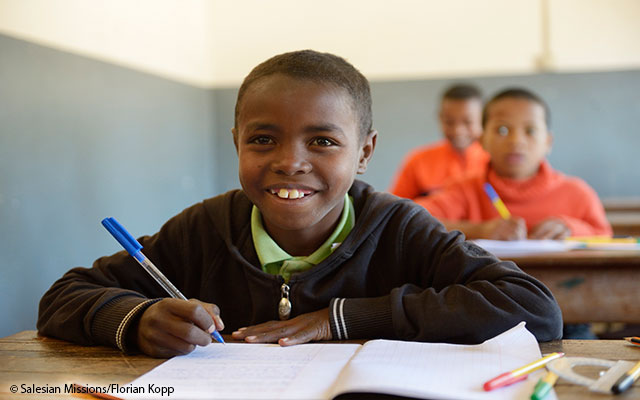
Madagascar: The Future Begins with Youth
Madagascar is a country rich in natural resources — oil, diamonds and gold — yet its people are among the poorest in the world. In fact, 92 percent of the population lives on just $2 per day: a situation so unimaginable that the United Nations ranks the nation 154 out of 188 on its Human Development Index. Without significant intervention, the Malagasy people are destined to fall even further into despair.
“Families are so desperate that they often force their children to drop out of school so they can send them to work in dangerous and exploitive jobs, just for the money,” explains Father Mark Hyde, director of Salesian Missions. “Newborns regularly die from diseases that are not only preventable — but curable.”
Madagascar is also a young country: more than 60 percent of its people are under the age of 25.
“If we are to emerge from our difficulties,” says Bishop Rosario Vella, a Salesian priest serving in Madagascar since 1981, “it is essential to guarantee an education for our children.”
This is why — in addition to providing crucial basic services such as free medical clinics, improved access to clean drinking water, food distribution and more — Salesian missionaries are working hard to expand programs that will help break the cycle of generational poverty.
Since 2007, for example, they have opened 41 elementary schools, four middle schools and three high schools for children whose families otherwise would not be able to afford an education. Students who successfully complete high school have the opportunity to attend the Salesian-run university in Ambanja.
“We also focus on practical training,” says Bishop Rosario, “because it gives youth a better chance to find a decent job and become self-sufficient adults.”
At the Salesian Vocational Training Center in Antananarivo, students learn in-demand trades such as carpentry and civil engineering. And targeted apprenticeship programs ensure they graduate with the real-world experience that makes them valuable to employers.
Throughout the country, missionaries also offer programs and services to educate and empower women. “When mothers are free of poverty’s suffocating effects, they can make sound decisions for themselves and their children,” explains Fr. Mark.
Through projects like TAIZA — a Salesian-led family support network — young, impoverished mothers and their babies can access social services as well as health education and clinics, and participate in peer support groups and literacy programs. These projects help improve developmental, educational and economic outcomes, and offer a crucial first step toward better lives and opportunities.
“This road is long, but it is one we are committed to travel alongside our Malagasy sisters and brothers,” says Bishop Rosario. “We are confident that, with these and similar interventions, youth will not only secure a stable future for themselves — but will also directly contribute to the modernization and growth of Madagascar as a whole.”
Our mission helps to break the cycle of poverty in places like Madagascar. What’s your mission?

